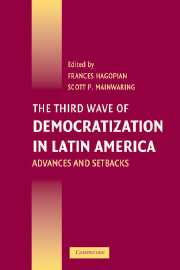Book contents
- Frontmatter
- Contents
- List of Figures
- List of Tables
- List of contributors
- Acknowledgments
- Introduction: The Third Wave of Democratization in Latin America
- 1 Latin American Democratization since 1978: Democratic Transitions, Breakdowns, and Erosions
- PART I THREE DEMOCRATIC GIANTS WITH AUTHORITARIAN PASTS: ARGENTINA, BRAZIL, AND MEXICO
- PART II UNEXPECTED DEMOCRACIES IN UNLIKELY COUNTRIES: BOLIVIA, EL SALVADOR, AND GUATEMALA
- 5 Bolivia's Democracy at the Crossroads
- 6 Challenges to Political Democracy in El Salvador
- 7 Democracy on Ice: The Multiple Challenges of Guatemala's Peace Process
- PART III DEMOCRATIC EROSIONS IN THE THIRD WAVE: COLOMBIA, PERU, AND VENEZUELA
- PART IV Conclusions
- References
- Index
5 - Bolivia's Democracy at the Crossroads
Published online by Cambridge University Press: 05 September 2012
- Frontmatter
- Contents
- List of Figures
- List of Tables
- List of contributors
- Acknowledgments
- Introduction: The Third Wave of Democratization in Latin America
- 1 Latin American Democratization since 1978: Democratic Transitions, Breakdowns, and Erosions
- PART I THREE DEMOCRATIC GIANTS WITH AUTHORITARIAN PASTS: ARGENTINA, BRAZIL, AND MEXICO
- PART II UNEXPECTED DEMOCRACIES IN UNLIKELY COUNTRIES: BOLIVIA, EL SALVADOR, AND GUATEMALA
- 5 Bolivia's Democracy at the Crossroads
- 6 Challenges to Political Democracy in El Salvador
- 7 Democracy on Ice: The Multiple Challenges of Guatemala's Peace Process
- PART III DEMOCRATIC EROSIONS IN THE THIRD WAVE: COLOMBIA, PERU, AND VENEZUELA
- PART IV Conclusions
- References
- Index
Summary
That institutional reforms alter behaviour is an hypothesis, not an axiom.
Robert Putnam, Making Democracy Work (1993)This chapter addresses two key issues concerning the process of democratic development in Bolivia in the last two decades. First, I tackle the issue of why Bolivia, notwithstanding its previous authoritarian past and a series of harsh obstacles during the transition, succeeded in building a stable competitive regime in the post-1982 period. Second, I assess the democratic regime's major advances as well as its shortcomings and present challenges. I consider whether this process has laid the foundations for a stable and consolidated democracy and how much the regime's lingering problems affect democracy's future viability. The key question is whether sheer survival or durability has been the major achievement, or whether a political process has taken place that has given rise to the conditions for a self-sustaining democracy.
Scott Mainwaring (1999c: 104) has stressed that in Latin America's third wave of democratization, “no development is more surprising than Bolivia's democratic stability since 1982.” Does this stability allow us to regard Bolivia's democracy as consolidated or moderately viable (Whitehead 2001: 3–20)? A consolidated democracy is one in which democracy as an intricate system of institutions, rules, and incentives has become “the only game in town” (Linz and Stepan 1996: 5). But consolidation does not involve a linear teleological process leading to a system capable of overcoming all challenges to its stability and precluding the possibility of future breakdown.
- Type
- Chapter
- Information
- The Third Wave of Democratization in Latin AmericaAdvances and Setbacks, pp. 149 - 178Publisher: Cambridge University PressPrint publication year: 2005
- 9
- Cited by



